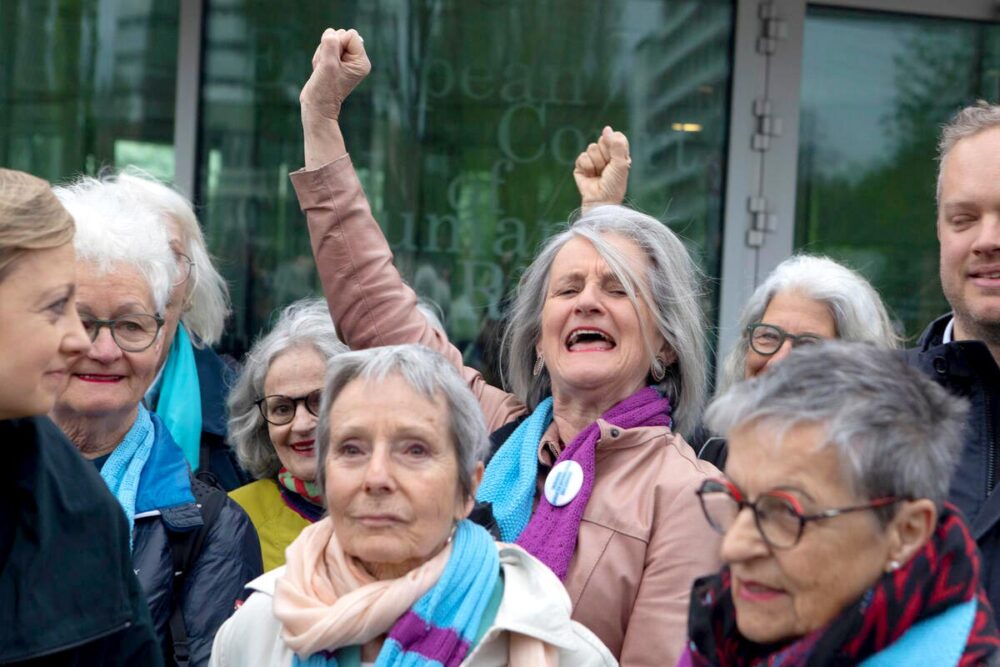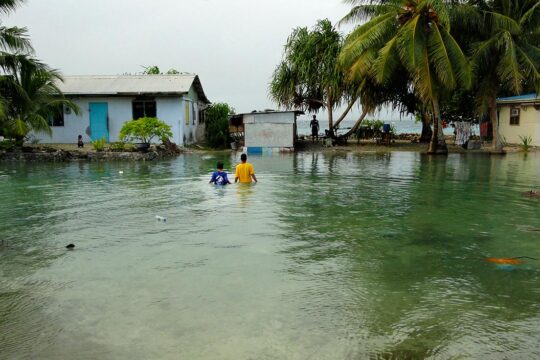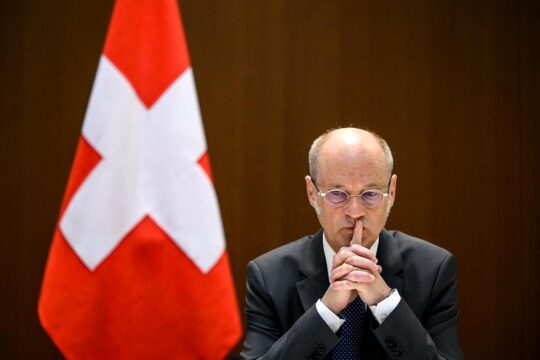“This verdict is an important milestone in the fight for a liveable climate for all,” said Anne Mahrer, co-president of the Senior Women for Climate Protection association, in a press release after the Strasbourg Court’s decision. “For nine years, we have been fighting for climate justice. We did not win in Swiss courts, but the ECHR today confirms that climate protection is a human right.”
On a European scale, this is indeed a first. On April 9, 2024, the European Court of Human Rights (ECHR) handed down a landmark ruling. In this case, the association Senior Women for Climate Protection Switzerland, which represents over 2,500 Swiss women over the age of 64, accused the Swiss government of violating four articles of the European Convention on Human Rights guaranteeing the right to life, to private and family life, to an effective remedy and to a fair trial. And the senior women have, for the most part, won their case.
The case dates back to November 2016, when the association lodged a complaint with the Swiss federal government. It argued the State was not doing enough under its national legal obligations to guarantee the good health of elderly people, who are particularly vulnerable to the effects of sharp temperature rises linked to climate change; nor was it doing enough to implement its international commitments linked to UN climate negotiations, in particular those under the 2015 Paris Agreement.
Twice, in 2017 and 2018, the Swiss courts rejected the seniors’ claims. But they did not admit defeat: inspired by the arguments of the Dutch court which, in 2015, for the first time condemned a State for climate inaction in a case brought by NGO Urgenda, they filed a new climate appeal in 2019 before the Swiss justice system, this time based on the violation of their human rights (in particular Articles 2 and 8 of the European Convention on Human Rights). But in May 2020, the Swiss courts once again rejected their complaint. So, six months later, they decided to take the case to a supranational court: the ECHR, a pan-European court whose decisions take legal precedence over those of national courts in the 46 member countries of the Council of Europe.
What was at stake in the ECHR’s decision on this case was whether it would uphold the Swiss judgments, or overturn them and follow the pioneering argument of the Dutch courts.
Protection against “serious adverse effects”
The 17 judges of the ECHR ruled by 16 votes to 1. Exceptionally long (286 pages), demanding and scientifically precise, their ruling of April 9 establishes that Article 8 of the Convention recognizes the right of individuals to “effective protection by the State authorities against the serious adverse effects of climate change on their life, health, well-being and quality of life”. And the judges go even further, pointing out that, in light of the most recent work of the International Panel on Climate Change (IPCC), States must “establish relevant targets and timetables” within a “domestic regulatory framework” to enable “effective mitigation measures” of greenhouse gas emissions, up to and including “net neutrality”.
However, with regard to Switzerland, the Court found that the implementation of this framework had “serious shortcomings”: in particular, a failure to establish a “carbon budget”, the absence of “national limits” on greenhouse gas emissions, and an inability to meet its targets. The Court concludes that Switzerland is not effective enough in its fight against climate change, fails to protect its population and violates the applicants’ right to respect for their private and family life (including “health, well-being and quality of life”).
Deeming that there was no “real and imminent risk” to the applicants’ own lives, the ECHR did not rule on the right to life argument. But it did rule that, in rejecting their appeals three times, the Swiss judicial authorities “failed to take account of the incontrovertible scientific data on climate change” and “failed to take seriously the grievances of the association”, which, according to the Court, was therefore denied a fair trial. In the end, the ECHR ordered Switzerland to pay €80,000 to the association for costs and expenses.
Symbolic European significance
In the absence of a claim by the plaintiffs, no damages were awarded. Switzerland's conviction in this case is therefore symbolic. It extends to a pan-European level the scope of victories achieved at national level (by Urgenda in the Netherlands, Notre affaire à tous in France and Friends of the Irish Environment in Ireland). But, unlike in these previous victorious climate cases before national courts, the Swiss government was not ordered to step up its plans to reduce greenhouse gas emissions.
Nevertheless, the ECHR ruling is historic. It is the first time that an international court has established that a State's failure to take climate action constitutes a violation of human rights. The Court thus recognizes the obligation of State protection against the serious effects of climate change as a new human right for citizens of all Council of Europe member States.
A “scandal” or a “slap in the face”?
The ECHR ruling provoked strong reactions in Switzerland, particularly from the Swiss People's Party (SVP), Switzerland’s the largest party in the last parliamentary elections which holds the portfolios of Economy, Environment, Transport and Energy in the Federal Council (Swiss government). In a press release, the SVP immediately described the decision as a “scandal and a denial of reality”, and called for Switzerland's withdrawal from the Council of Europe. For the conservative party, this is simply “brazen interference in Swiss politics” by foreign judges.
The country’s second-largest political party, the Swiss Socialist Party (PS), took a different view, hailing the court's ruling as “a slap in the face for the Federal Council and its climate inaction”. In a press release, the party said that “this ruling confirms what the Swiss Socialist Party has been arguing for years: only massive public investment will be able to ensure the transition to energy and climate change without leaving anyone behind”.
In Switzerland, the Federal Office for the Environment reports that GHG emissions amount to 13 tonnes of CO2 per capita per year, placing the country among the world’s top 20 emitters. According to the World Bank, Swiss GHG emissions are still 40 times lower than those of Russia, the continent’s biggest emitter.
Impact on other complaints beyond Europe?
According to Dutch lawyer Dennis Van Berkel, who advised the Swiss Senior Women for Climate Protection at the ECHR, “the ECHR ruling clearly means that European countries need to base their GHG emission targets on a fair share of the remaining carbon budget for limiting global warming to 1.5 C”. Also legal advisor for the Dutch NGO Urgenda, he believes that “given the small remaining carbon budget for Switzerland, it will also need to assist poorer countries with their renewable energy transition in addition to reducing GHG emissions within its own territory”.
In his view, “the ECHR’s decision could greatly influence other climate appeals underway before this same jurisdiction, but also before the International Tribunal for the Law of the Sea, Inter-American Court of Human Rights and before the International Court of Justice, seized since 2023 at the request of Vanuatu of an opinion on the responsibility of countries in relation to climate change”.
By establishing a direct link between climate change and human rights violations, and by setting a legal precedent for the 46 member countries of the Council of Europe, the Court’s decision opens the door to new appeals by citizens’ groups. There have been more and more of these appeals over nearly years, since the signing of the Paris Climate Agreement.








